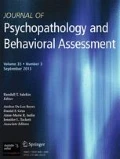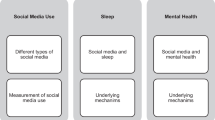Abstract
In the past, child bedtime routines have been examined through observation or sleep diaries. These methods are often expensive and hinder study comparisons due to lack of consistent operational definitions of routines. This article describes the development and psychometric evaluation of the Bedtime Routines Questionnaire (BRQ), a 31-item paper-and-pencil, parent-report measure of children’s bedtime routines. The BRQ and related measures were completed by 226 caregivers of children ages 2 to 8. The BRQ demonstrated a solid factor structure, adequate internal consistency, and fair validity coefficients. Overall, promising results for the BRQ are reported.
Similar content being viewed by others
References
Adams, L. A., & Rickert, V. I. (1989). Reducing bedtime tantrums: comparison between routines and graduated extinction. Pediatrics, 84, 756–761.
American Psychiatric Association. (2000). Diagnostic and statistical manual of mental disorders. Fourth edition text revision. Washington: American Psychiatric Association.
Bates, J. E., Viken, R. J., Alexander, D. B., Beyers, J., & Stockton, L. (2002). Sleep and adjustment in preschool children: sleep diary reports by mothers relate to behavior reports by teachers. Child Development, 73, 62–74.
Boyce, W. T., Jensen, E. W., Cassel, J. C., Collier, A. M., Smith, A. H., & Ramey, C. T. (1977). Influence of life events and family routines on childhood respiratory tract illness. Pediatrics, 60, 609–615.
Brown, F. C., Bulboltz, W. C., Jr., & Soper, B. (2002). Relationship of sleep hygiene awareness, sleep hygiene practices, and sleep quality in university students. Behavioral Medicine, 28(1), 33–38.
Buckhalt, J. A., El-Sheikh, M., & Keller, P. (2007). Children’s sleep and cognitive functioning: race and socioeconomic status as moderators of effects. Child Development, 78, 213–231.
Cotton, S., & Richdale, A. (2006). Brief report: parental descriptors of sleep problems in children with autism, Down syndrome, and Prader-Willi syndrome. Research in Developmental Disabilities, 27, 151-161.
Crosby, B., LeBourgeois, M. K., & Harsh, J. (2005). Racial differences in reported napping and nocturnal sleep in 2- to 8-year-old children. Pediatrics, 115, 225–232.
DeVellis, R. F. (1991). Scale development: theory and applications. Newbury Park: Sage.
Eisenberg, A., Murkoff, H. E., & Hathaway, S. E. (1996). What to expect the toddler years. New York: Workman Publishing Company.
Ellis, J., Hampson, S. E., & Cropley, M. (2002). Sleep hygiene or compensatory sleep practices: an examination of behaviours affecting sleep in older adults. Psychology, Health and Medicine, 7(2), 157–162.
El-Sheikh, M., Buckhalt, J. A., Keller, P. S., Cummings, E. M., & Acebo, C. (2007). Child emotional insecurity and academic achievement: the role of sleep disruptions. Journal of Family Psychology, 21, 29–38.
Evans, D. W., Leckman, J. F., Carter, A., Reznick, J. S., Henshaw, D., King, R. A., et al. (1997). Ritual, habit, and perfectionism: the prevalence and development of compulsive-like behavior in normal young children. Child Development, 68(1), 58–68.
Fiese, B. H., Tomcho, T. J., Douglas, M., Josephs, K., Poltrock, S., & Baker, T. (2002). A review of 50 years of research on naturally occurring family routines and rituals: Cause for celebration? Journal of Family Psychology, 16(4), 381–390.
Fiese, B. H., Winter, M. A., Sliwinski, M., & Anbar, R. D. (2007). Nighttime waking in children with asthma: an exploratory study of daily fluctuations in family climate. Journal of Family Psychology, 21, 95–103.
Fiese, B. H., & Kline, C. A. (1993). Development of the family ritual questionnaire: initial reliability and validation studies. Journal of Family Psychology, 6(3), 290–299.
Greenman, J. (2005). What happened to MY world? Helping children cope with natural disaster and catastrophe. Watertown: Comfort for Kids.
Hair, J. F., Jr., Black, W. C., Babin, B. J., Anderson, R. E., & Tatham, R. L. (2006). Multivariate data analysis (6th ed.). Upper Saddle River: Pearson Education Inc.
Handler, C. S. (1997). “It’s time to go”: How to get your preschooler to change gears without tears. Parent’s Magazine, 72, 181–182. 184.
Harsh, J. R., Easley, A., & LeBourgeois, M. K. (2002). An instrument to measure children’s sleep hygiene [abstract]. Sleep, 25, A316.
Henderson, J., Jordan, S. S., & Gryczkowski, M. (2006). Measuring child routines in five year olds: which measure is most appropriate? A poster presentation at the 57th annual meeting of the Mississippi Psychological Association. MS: Jackson.
Hollingshead, A. B. (1975). A four-factor index of social status. New Haven: Yale University Sociology Department.
Jensen, E. W., James, S. A., Boyce, W. T., & Hartnett, S. A. (1983). The family routines inventory: development and validation. Social Science and Medicine, 19, 201–211.
Jordan, S. S. (2003). Further validation of the Child Routines Inventory (CRI): Relationship to parenting practices, maternal distress, and child externalizing behavior. Unpublished doctoral dissertation, Louisiana State University.
Kuhn, B. R., & Weidinger, D. (2000). Interventions for infant and toddler sleep disturbance: a review. Child and Family Behavior Therapy, 22(2), 33–50.
Lavigne, J. V., Arend, R., Rosenbaum, D., & Smith, A. (1999). Sleep and behavior problems among preschoolers. Developmental and Behavioral Pediatrics, 20(3), 164–169.
LeBourgeois, M. K., Hancock, M., & Harsh, J. (2001). Validation of the Children’s Sleep-Wake Scale (CSWS) [abstract]. Sleep, 24, A219.
LeBourgeois, M. K., & Harsh, J. (2001). A new research instrument for measuring children’s sleep [abstract]. Sleep, 24, A213.
Meltzer, L. J., & Mindell, J. A. (2006). Sleep and sleep disorders in children and adolescents. Psychiatric Clinics of North America, 29, 1059–1076.
Milan, S., Snow, S., & Belay, S. (2007). The context of preschool children’s sleep: racial/ethnic differences in sleep locations, routines, and concerns. Journal of Family Psychology, 21, 20–28.
Mindell, J. A., Kuhn, B., Lewin, D. S., Meltzer, L. J., & Sadeh, A. (2006). Behavioral treatment of bedtime problems and night wakings in infants and young children. Sleep, 29(10), 1263–1276.
Mindell, J. A. (1999). Empirically supported treatments in pediatric psychology: bedtime refusal and night wakings in young children. Journal of Pediatric Psychology, 24(6), 465–481.
National Sleep Foundation (2003). Sleep diary. Retrieved May 11, 2005, from http://www.sleepfoundation.org.
Nelson, J., Erwin, C., & Duffy, R. (2007). Positive discipline: the first three years (2nd ed.). New York: Three Rivers.
Owens, J. A., Spirito, A., & McGuinn, M. (2000). The Children’s Sleep Habits Questionnaire (CSHQ): psychometric properties of a survey instrument for school-aged children. Sleep, 23, 1043–1051.
Plaud, J. J., & Plaud, D. M. (1998). Clinical behavior therapy and the experimental analysis of behavior. Journal of Clinical Psychology, 54(7), 905–921.
Reynolds, C. R., & Kamphaus, R. W. (2004). Behavior assessment system for children (3rd ed.). Circle Pines: AGS Publishing.
Sadeh, A. (1996). Evaluating night wakings in sleep-disturbed infants: a methodological study of parental reports and actigraphy. Sleep, 19, 757–762.
Sadeh, A. (2004). A brief screening questionnaire for infant sleep problems validation and findings for an internet sample. Pediatrics, 113, e570–e577.
Snell, E. K., Adam, E. K., & Duncan, G. J. (2007). Sleep and the body mass index and overweight status of children and adolescents. Child Development, 78, 309–323.
Sytsma, S. E., Kelley, M. L., & Wymer, J. H. (2001). Development and initial validation of the child routines inventory. Journal of Psychopathology and Behavioral Assessment, 23(4), 241–251.
U.S. Census Bureau (2006). Current Population Survey, 2004 to 2006 Annual Social and Economic Supplements. Retrieved May 13, 2009 from http://www.census.gov/hhes/www/poverty/poverty05/table5.html.
Williams, G., Sears, L., & Allard, A. (2004). Sleep problems in children with autism. Journal of Sleep Research, 13, 265–268.
Wittig, M. M. (2005). Development and validation of the child routines questionnaire: preschool. Unpublished doctoral dissertation, Louisiana State University.
Yang, C., & Spielman, A. J. (2001). The effects of a delayed weekend sleep pattern on sleep and morning functioning. Psychology and Health, 16, 715–725.
Acknowledgements
Portions of this study were originally conducted by the first author as a Master’s Thesis, in partial fulfillment of requirements for a doctoral degree in Clinical Psychology. The authors wish to thank Randolph C. Arnau, Ph.D. and John Harsh, Ph.D. for their helpful comments on earlier drafts of this paper. Further information regarding the development and scoring of the BRQ is available upon request.
Author information
Authors and Affiliations
Corresponding author
Appendix A
Appendix A

Rights and permissions
About this article
Cite this article
Henderson, J.A., Jordan, S.S. Development and Preliminary Evaluation of the Bedtime Routines Questionnaire. J Psychopathol Behav Assess 32, 271–280 (2010). https://doi.org/10.1007/s10862-009-9143-3
Received:
Accepted:
Published:
Issue Date:
DOI: https://doi.org/10.1007/s10862-009-9143-3



